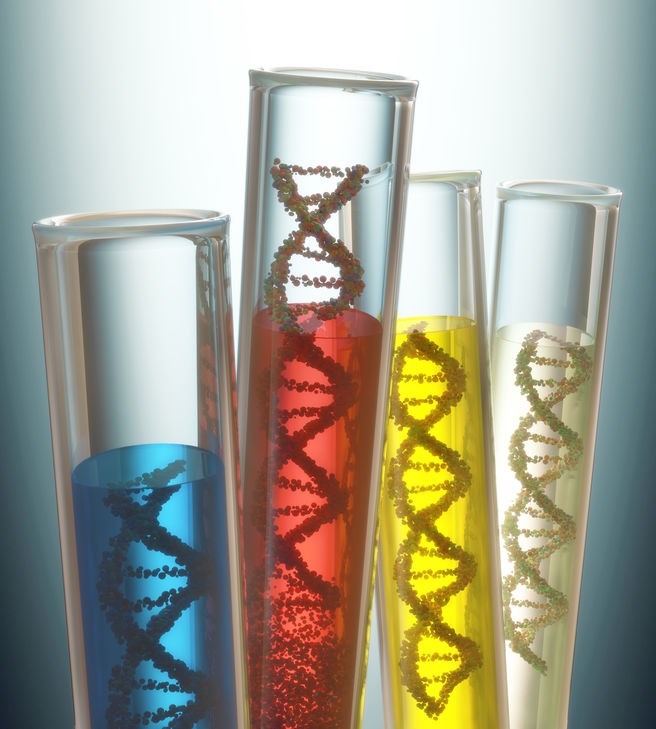 The truth about coffee is that its caffeine can be dodgy for acne, but on the whole, it has many advantages like antioxidants.
The truth about coffee is that its caffeine can be dodgy for acne, but on the whole, it has many advantages like antioxidants.
We recommend strategies such as restricting caffeine to the morning, buying shade grown blends, and not mixing in spoon after spoon of sugar. However, no matter how carefully you plan, one factor could still trip you up – your genes.
If you’re a coffee aficionado then you’ve probably suspected this for years. If you’ve ever decided that you’re just not built for caffeine, while your blissfully smiling co-worker has a coffee IV drip in her arm, then your instincts may have been correct.
There are several genes which make caffeine’s benefits, but also its downsides, last much longer in human beings.
There’s no getting around it: you may have received an unlucky roll of the dice, landing on 1 with a depressing thud. There’s isn’t much you can do until the golden age of genetically engineered superhumans arrives (assuming we haven’t been wiped out by A.I. with a few thousand of us left huddling together on a Mars colony). However, it’s better than burying your head in the sand, so here’s the current situation on caffeine-influencing genetics.
The king of caffeine genes
Caffeine is as powerful as a drug (arguably the world’s most popular), rampaging through the body and bouncing off hormones, neurotransmitters and enzymes.
Therefore, it’s not surprising that numerous genes affect it, and the classic is CYP1A2.
In short, CTP1a2 is the gene which creates the p450 enzyme. P450 is the second biggest detoxification agent in the human body after glutathione (vital for acne), metabolising countless common medications. Altering P450 is why the humble grapefruit can make statins, triazolam and and the antibiotic erythromycin way too powerful.
Through this pathway, CYP1a2 is responsible for 90% of the human body’s caffeine metabolism, breaking it down into three main metabolites: paraxanthine (81.5% of metabolites), theobromine (10%) and theophylline (5.4%). The CYP2E1 gene also plays a small role in creating the latter two.
Slowly, as the mysterious fog of genetics clears, the population has divided into three groups of caffeine tolerators.
Everyone has the CYP1A2 gene, but an A allele gives you motorised caffeine metabolisation with steam coming out of your ears, while a C allele makes it a snail’s pace. Approximately 40% of the population have an A/A allele, 50% are average Joes with a A/C combination, while 10% are cursed with C/C. Another term is CYP1A2*1A for fast genes and CYP1A2*1F for slow genes.
The average half life for caffeine in the human body is 4-6 hours, once estimated at 5.7 hours. For example, if you gulped down a 200mg cup in 1.42 seconds before dashing out the front door to work at 8:00am, you would have 100mg remaining in your bloodstream during your lunch break at 1.42PM.
People with inferior CYP1A2 genes can have a caffeine half life as long as 10 hours. Your school friend might be able to down five cups, write a 5000 page, mind-numbingly dull essay about Roman poetry, and crash into a deep sleep instantly, whereas you might be twiddling your thumbs till 7am if you tried the same.
CYP1A2 – world tour 2020
Like with any gene, CYP1a2 also varies with geographical distance.
Scientists decided that since Indians are over 1/6th of the world’s population, it might just be a decent idea to see whether they can process medications correctly (study).
The result was resolute: whereas 29% of Europeans carried the slow CYP1a2F allele, the figures for Pakistanis, Punjabi Sikhs and Gujarati were 45%, 42% and 51% respectively.
This might explain why coffee is snubbed in India in favour of tea, although the old British influence might also explain that. Social observers everywhere are still scratching their heads about why coffee hasn’t taken off. Coffee consumption in India supposedly doubled from 1996 to 2016, but Starbucks only opened its first shop branch there in 2012.
Coffee executives are no doubt meeting in their boardrooms with very grave expressions, angrily debating the “Indian problem”, but its’s all down to a simple gene, which probably causes Indian people to instinctively shy away from it. Africans also carry more of the slow CYP1A2 alleles (study).
Right now, CYP1A2 is the caffeine gene we understand the best, by far. The weird differences you notice to your coffee-guzzling friend could be down to this gene.
But does it affect your skin?
 Coffee-fuelled acne outbreaks are one of the rare areas where CYP1A2 hasn’t been tested yet.
Coffee-fuelled acne outbreaks are one of the rare areas where CYP1A2 hasn’t been tested yet.
Scientists haven’t even tested raw honey on acne, so there’s no chance they’ll be wasting time on this subject. However, we have strong hints in the huge catalogue of studies on other health conditions.
Caffeine is endlessly debated in the mass media. Newspaper headlines warn of a heart attack waiting to happen, while athletes, gym rats, revising students and stock market wizards say it’s harmless. Coffee manufacturers also tend to support coffee.
The debate has been raging for years and is going nowhere fast. In truth, it really boils down to the dosage, and the original coffee beans’ nutrients, but what’s clear is that your genetics increase the risks massively.
BLOOD PRESSURE: 553 white men and women were ordered to fill in a questionnaire about their coffee drinking habits. 8.2 long years passed. 323 fell victim to hypertension, but genotyping revealed that slow CYPA12 allele carriers had a significantly increased risk when drinking coffee.
For the golden fast allele carriers, coffee was harmless. The conclusion: “the risk of hypertension associated with coffee intake varies according to CYP1A2 genotype” (study).
MYOCARDIAL INFARCTION – AKA, a mild, non-fatal heart attack. From 1994 to 2004, 2014 Costa Ricans filled in a coffee consumption questionnaire once again. Only carriers of the slow CYP1A*1F gene had an increased risk of non-fatal mycordial infarction from high coffee consumption. CYP1A*1A carriers were shielded, and probably looked very smug (study).
BLOOD SUGAR: the diabetic community is very worried about caffeine these days, for its blood sugar increasing properties. This study tested 1180 non-diabetic patients, aged 18-45, and still found that CYP1A*1F allele carriers were prone to much higher blood glucose after drinking coffee. Fast CYP1A*1A allele carriers had a slightly increased risk, but this barely reached statistical significance.
CANCER: caffeine’s cancer-protecting properties are very interesting; the more caffeinated the coffee, the greater the protection (study). However, among 411 female carriers of a gene predisposing them to breast cancer, the fast CYPA1*1A completely nullified coffee’s benefits (study).
Meanwhile, the slow carriers had a 64% reduced risk of breast cancer. It’s the reverse of the above; this time, the special genes rob you of caffeine’s benefits. This study was nearly identical, but for ovarian cancer.
The effect on acne
These studies are great to know about anyway, but they also solidify the connection to acne. They prove that CYP1A2 can manifest in the real world, and escape from the realm of technical scientific speculation.
The classic acne danger is stress, as caffeine can spike the stress hormone cortisol by up to 50%. However, some acne patients have unexplained, almost-allergy like sensitivities.
I wouldn’t be surprised if caffeine has obscure links to acne like increasing oil production or decreasing glutathione levels. It has benefits too; there’s tons of studies now showing sun protection. Caffeine inhibits ATR, a molecule that prevents skin cancer cells from self destructing (apoptosis).
Regardless, if caffeine is indeed a globe trotting international acne dealer, your genetics are probably a big factor in whether you can tolerate it, and preserve your favourite beverage.
Actually, the high blood sugar studies are relevant to acne, by increasing the formation of free radicals called AGEs. Hyperglycemia also increases dead skin cell turnover, the genesis of clogged pores. So that’s one immediate connection.
The second in command – adenosine
 The other big gene that scientists have identified. Instead of increasing bloodstream caffeine, the ADORA2A gene affects its potency, how easily it manipulates your mind.
The other big gene that scientists have identified. Instead of increasing bloodstream caffeine, the ADORA2A gene affects its potency, how easily it manipulates your mind.
In short, ADORA2A regulates your adenosine receptors, the neurotransmitter behind caffeine’s famous mental affects.
All human beings produce adenosine in response to waking, to thinking, to remembering, to concentration, to any brain work. Adenosine builds up in your brain cells over the course of your waking hours. It’s the “drowsiness hormone”, and as night falls, keeping your eyes open eventually becomes irresistable. It works by binding to A1 receptors, forcing muscle relaxation and sleepiness. It also binds to the A2A receptors, which block other neurotransmitters, such as the stimulating dopamine and glutamate. You might not know the name, but you’ve definitely felt its powers; so has an elephant in Africa and your pet dog.
Caffeine’s mental effects like alertness and quick fire thinking come from binding to the adenosine receptors in its place. It’s the perfect fit, as are two of its metabolites, theophylline and theobromine (though more mildly). Blocking adenosine is why Starbucks coffee allows you to memorise all 196 capital cities for a geography exam (which you then forget two minutes after leaving the exam hall).
As for the ADORA2A gene, it controls the adenosine A2A receptors. It has two variations, the C and T allele.
The rates in the population are believed to be 45% C/T, and 20-30% each for C/C and T/T. Studies show that T/T carriers rate themselves as sensitive to caffeine, whereas C/C are the opposite, so it seems that ADORA2A gene variations control the receptor’s responsiveness to caffeine. The receptors could even be physically bigger, and harder to block, like a giant football goal.
Hard data which proves the link
In 2012, 4,329 people completed a questionnaire about their sleep quality. Interestingly, self-rated caffeine sensitivity (like the paranoid, twitchy-looking guy who insists he can’t have a single sip) matched closely to their gene polymorphisms. The T/T was associated with poor sleep and C/C with baby-like sleep.
They then fed them coffee, and importantly, the caffeine in their saliva didn’t differ based on self-reported caffeine sensitivity, which proves that in this case, a gene other than CYP1A1 was responsible (study).
This 2008 study was more direct, feeding human beings 150mg of caffeine. Those with higher reported stress levels were more likely to have the ADORA2A gene T/T polymorphism.
Another anxiety study gathered 162 non/low coffee drinkers and 217 moderate/high ones. They were given an equal 100mg dose of caffeine, followed by 150mg more an hour later. The T/T allele-ers scored highest for anxiety, alertness, and headaches.
This gene could explain why some people can’t sleep after a mere mouthful of coffee, but most importantly, adenosine is a relaxing, calming hormone. Blocking it can bring on the notorious coffee anxiety that many people fear.
The link to acne is obvious, via surging stress hormones, a connection which is constantly strengthening. Earlier this year, receptors were discovered in p.acnes bacteria which were a perfect fit for catecholamines, AKA adrenaline and norepinephrine. By beaming in a like a satellite dish, these adrenal hormones could make the bacteria more aggressive, in a totally unexpected discovery.
ADORA2A is massively important for acne, and like CYP1A2, evidence for its existence is plentiful. It’s not all bad news though: in the third study, high coffee drinkers showed a blunted anxiety increase from a 150mg dosage regardless of their genes, showing that everyone’s body can gradually adapt.
The story continues
 Another possible player is PDSS2, a little known gene which blasted its way onto newspaper headlines in 2016 (since the words “coffee study” practically guarantee an avalanche of sales).
Another possible player is PDSS2, a little known gene which blasted its way onto newspaper headlines in 2016 (since the words “coffee study” practically guarantee an avalanche of sales).
A gang of scientists journeyed to Europe and studied 1,731 people in the Netherlands, followed by 1,213 people across 7 obscure villages in Italy. The experiment was a familiar one: their coffee intake was questioned before a mad scientist stepped in and examined their genetic code.
Villagers with unusual polypmorphisms in PDSS2 drank much less coffee overall. This was supposedly automatic, as the alertness and hyperactivity became so potent that they never found themselves reaching for another cup.
This is the only human study so far, and few mechanisms were given, but they did mention a mouse experiment where knocking out PDSS2 in the liver increased caffeine metabolism enzymes. The safe bet is that PDSS2 is the puppetmaster of CYP1A2 somehow.
Interestingly, the gene also creates coenzyme Q, a popular supplement in natural health circles and an antioxidant that your body manufactures itself. There could be a hidden connection to caffeine, or it could be a pure red herring.
There’s also N-acetyltransferase type 2 (NAT-2). This only plays a small role in metabolising caffeine, but variations are so proven that caffeine is now used by doctors to detect slow alleles, because NAT-2 also affects drugs like hydralazine (blood pressure) and dapsone (an antibiotic). It was once estimated that 53% of the Danish population are sluggish NAT-2 allele carriers while 47% are fast. The smart strategy is to turn into a Korean or Japanese person, 87% of whom carry the fast NAT-2 allele.
The 2008 study on ADORA2A also noticed anxiety from variations in the DRD2 gene, a gatekeeper of the neurotransmitter dopamine. Like gambling, cocaine, or sugar, coffee stimulates the dopamine receptors and gives you a giddy rush, so if people carry dopamine alleles more sensitive to caffeine, then it could easily mitigate the anxiety of blocking adenosine.
The verdict
The power of caffeine, and the power of caffeine to cause acne, is massively affected by your genes. The evidence is rising by the second.
Luckily though, the situation is not completely grim. With so many genes, you’re never just caffeine sensitive or not – you can have different combinations.
Yes, there are probably secret caffeine-swilling superwarriors walking the streets who have the perfect alleles for every single gene out there. Maybe you’ve been astonished at how much coffee your friend can gulp down without suffering a single rapid heartbeat. Likewise, if you’re unlucky, you may be cursed with every unfortunate caffeine gene known to man (although you’ll probably then have longevity genes that make you live to 100).
However, the likelihood is that you’ll have a combination. With the mysteries of caffeine genetics still unsolved, you are left with one option – good old experimentation. Luckily, one of caffeine’s main dangers, stress and anxiety, is dead easy to spot. There’s nothing subtle about it. Similarly, random sensitivities tend to spring up on the face very quickly.
My guess is that all but a tiny minority will be able to drink one or two cups per day.
Thanks for reading!